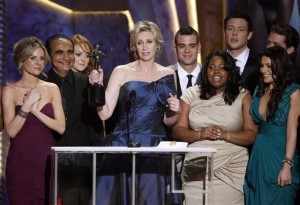The song is over as ‘Glee’ ends its tuneful 6-season run

FILE – In this Jan. 23, 2010 file photo, Jane Lynch, center, and the cast of “Glee” accept the award for best ensemble in a comedy series at the 16th Annual Screen Actors Guild Awards in Los Angeles. “Glee” will conclude its six-season run with a two-hour finale on Friday, March 20, 2015. (AP Photo/Mark J. Terrill)
NEW YORK— The “Glee” series finale delivered glorious news that William McKinley High School is being turned into an arts school and that Will Schuester, who started its glee club way back in 2009, will become its principal.
Oh, and that wondrous show choir, New Directions, won the national championship.
But “Glee” always had the underlying message: With a song in your heart, dreams do come true.
Another dream fulfilled: Mercedes (Amber Riley) told the gang she’ll be the opening act on Beyonce’s upcoming world tour.
Cue the songs: “Teach Your Children” … “Someday We’ll Be Together” … “The Winner Takes It All” … “Daydream Believer.”
That’s how it went — happily ever after — as the Fox song-and-dance show concluded its six-season run Friday night (US time).
Oh, sure, there were some unexpected nightmares, too. Looking ahead five years, faculty mean girl Sue Sylvester was seen winning a second term as vice president of the United States (in the Jeb Bush administration). She announced to Geraldo Rivera that she planned to seek the presidency in 2024.
On a brighter note, five years from now Rachel will be a surrogate mom for gay couple Kurt and Blaine. She’ll also be a Tony winner: “Being a part of something special does not make you special,” she said on accepting her award. “Something is special because you are a part of it.”
The show finished with a rousing rendition of “I Lived.”
“Glee” leaves behind a remarkable legacy.
First of all, it dared to try something that had seldom if ever succeeded in television history, blending episodic narrative with musical production numbers. It set those performances in the context of New Directions at fictitious McKinley High, a setting replete with stories about growing up, self-acceptance, perseverance and dreams.
“Glee” did something else few would have thought possible: It helped make glee clubs cool while it promoted arts programs in schools.
And it served as a platform for new talent, launching such stars as Lea Michele (Rachel) while giving wide exposure to veterans like Matthew Morrison (Will) and Jane Lynch (Sue), with guest appearances by a broad range of celebrities that included Helen Mirren, Lindsey Lohan and Ricky Martin.
Pop music — both new and well-established — reached new audiences, both on the show and through sales of more than 50 million songs and 13 million albums under the “Glee” signature.
While it was demonstrating a viewer appetite for musical theater among its audience, “Glee” accomplished one more thing: It highlighted, and even helped normalize, young people traditionally deemed marginal both in real life and on TV. Among the characters included in the “Glee” big tent was transgender girl Wade “Unique” Adams. Tolerance, or at least reaching for it, was a “Glee” hallmark.
On “Glee,” glee club was the default matter-of-life-and-death. But story lines frequently reminded its membership, along with the viewers, that plenty of other things were equally important — or even more so.
During its mostly joyous run, “Glee” weathered loads of onscreen drama. But there was bitter, real-life drama, too — notably the death of Cory Monteith. A breakout star who played singer-quarterback Finn Hudson, he had struggled off-camera with substance abuse. Then, in July 2013, he died at 31 of an accidental alcohol and drug overdose.
That October, “Glee” said goodbye to Finn (whose death, never described, was written into the series) while paying tribute to Monteith in an emotional farewell episode where reality intruded all too vividly on the show’s make-believe tale.
In the finale, the fabled high school auditorium five years from now will be renamed for Finn Hudson.
Meanwhile, reality intruded once again: For the characters at McKinley High, as well as the audience that has followed them with every note, graduation day has come.
RELATED STORIES
‘Glee’ starts over for the last time